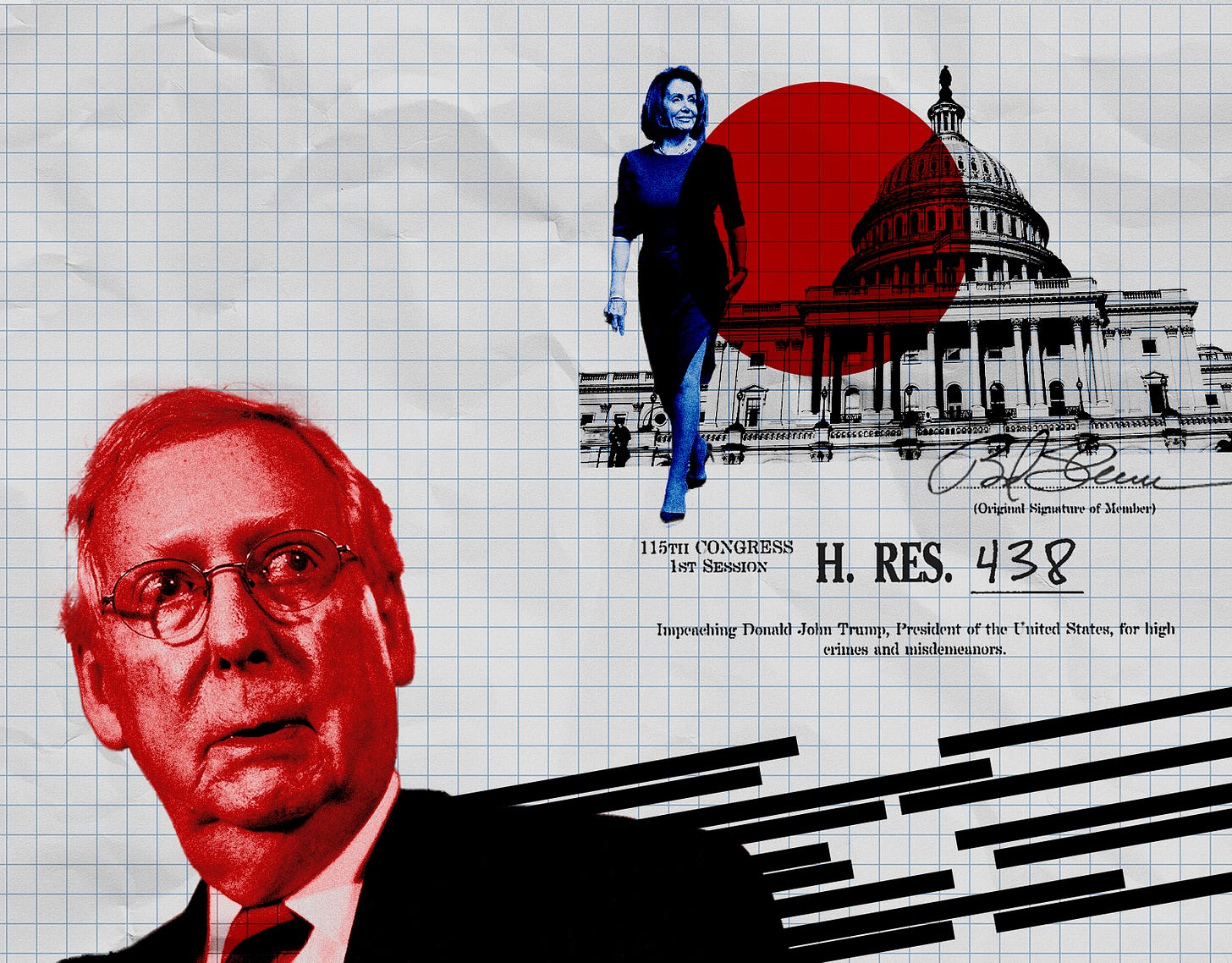Politics or Principle: Congress Must Decide
If Congress takes the easy way out, it will give license to future presidents.
What next?
Now that both the American people and Congress have the Mueller report, what should be done? Or more acutely, now that Congress has this damning profile of a president who tried to do whatever he could to block the Mueller investigation and stop the truth from getting out, how should our elected representatives respond?
The answer is simple: Congress should do what the Constitution authorizes them to do, which is perform oversight and pass legislation based on the report’s findings. But the politics is much more complicated. And so Congress, namely the Democrat-controlled House, may not do much of anything.
Here's what should be done:
First off, Congress should get access to the full, unredacted report, including all of its grand jury information. In order to fully execute their Constitutional oversight, Congress needs to see every single word in the report, including all the underlying documents. This is in the public interest. That should carry the day here.
As Kim Wehle argues, there is precedent in independent investigations of the president for Congress to receive grand jury materials. Congress will have to petition the D.C. Circuit court to get them. But regardless of how long that process takes to play out, Congress must have access to every word, comma, and period in this 448-page-plus report.
Second, Congress needs to take the entire report and fulfill its duty of determining whether this president's behavior is befitting of the office. Robert Mueller's job was to determine whether or not the president should go to jail. Congress's job is to determine whether he should remain president.
It is pretty clear from the report that the president committed obstruction of justice. Mueller lays out the obstruction case blow by blow, providing 10 specific examples and the three standards for meeting the crime. He didn’t recommend an indictment based on a legal theory about prosecuting sitting presidents. The underlying evidence, though, is damning—and Mueller appears to have left it to Congress to handle.
The president used the bully pulpit to impede the investigation: As Mueller writes, he engaged in conduct “involving public attacks on the investigation, non-public efforts to control it, and efforts in both public and private to encourage witnesses not to cooperate.” Trump encouraged and directed those around him to get in the way at every turn: Mueller writes, “The President’s efforts to influence the investigation were mostly unsuccessful, but that is largely because the persons who surrounded the President declined to carry out orders or accede to his requests.” That behavior starts with Trump. And if it’s not obstruction, then nothing is.
Congress needs to examine the president's behavior on the whole collusion/conspiracy issue, as well. Again, though Mueller determined this behavior wasn't criminal, Congress must judge whether or not the president was sufficiently unethical, corrupt, unpatriotic, and just plain bad to warrant impeachment. As part of this oversight, both Attorney General Bill Barr and Special Counsel Robert Mueller should be called to testify.
Third, the above ties into the elephant in the room. Congress needs to investigate the very unsettling question of why then-candidate Trump and his campaign team, knowing that Russia was interfering in the election to help him, did nothing to stop it, did not alert authorities, and, as is made clear in the report, actually welcomed and encouraged this interference from a foreign adversary. The report details disturbing behavior here which, though not criminal, is troubling and damaging to America. Congress must investigate this and tie it in with the counterintelligence investigation of President Trump's personal and business ties with Russia.
Fourth, upon carrying out its Constitutional obligations of oversight, it is up to Congress—not Bill Barr and not Robert Mueller—to determine if Donald Trump is fit to be president and whether or not any of his behavior rises to the level of impeachment. Mueller actually alludes to this authority in his report: "The conclusion that Congress may apply the obstruction laws to the President's corrupt exercise of the powers of office accords with our Constitutional system of checks and balances and the principles that no person is above the law.”
That sure sounds like an impeachment referral.
The Democrats will feel great political pressure to avoid impeachment, fearing that impeachment proceedings will hurt the party politically in 2020. That shouldn't matter. The Mueller report paints a very damning portrait of this president. It paints a picture of someone who knew Russia was interfering, invited that interference, and then did everything in his power to stop the investigation into that interference. As difficult as it might be politically to go down the impeachment road, to ignore the bad behavior laid out in this report would be to give license to future presidents to do the same.
Fifth, remember why we're here. Remember why there was an investigation to begin with: A foreign adversary tipped the scales of our election. Robert Mueller comprehensively lays out what Russia did. We must do all we can do to ensure this interference is minimized in the future. Congress must introduce and pass legislation to enhance our election security and contemplate legislation addressing the broader issues of abuses of power that we've seen coming out of this White House.
The presidency has grown much too powerful. Trump is just the most extreme and recent manifestation of this truth. Congress should use this unfortunate and unprecedented Russian attack as an opportunity to reassert the authority granted to it by the Constitution.


